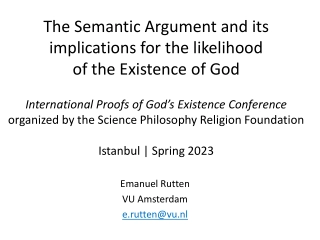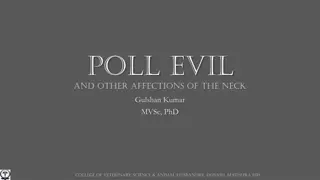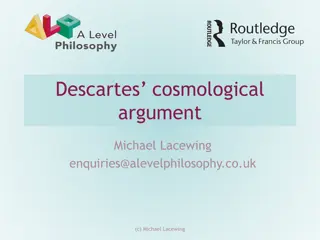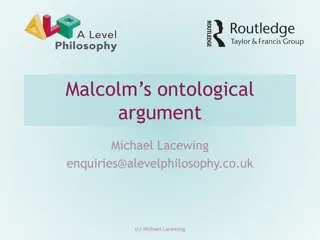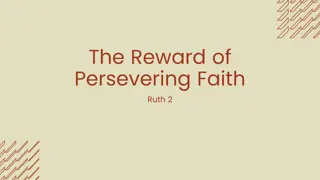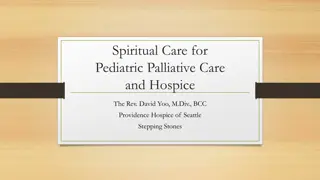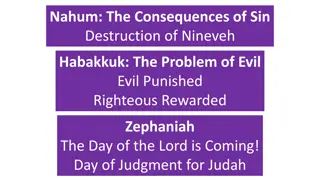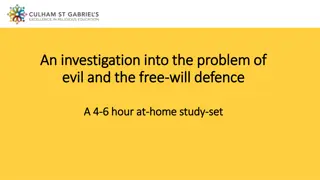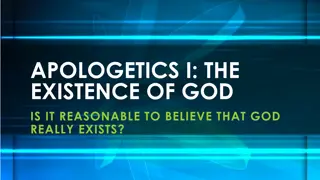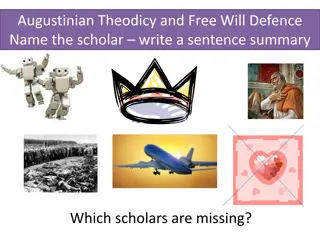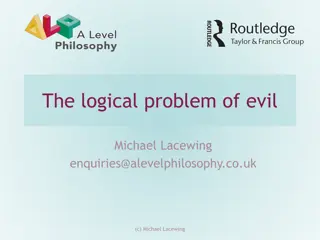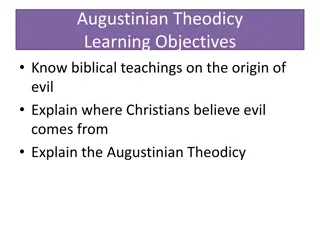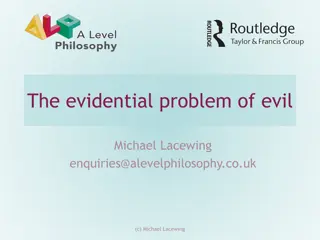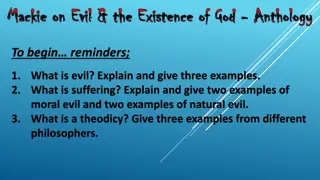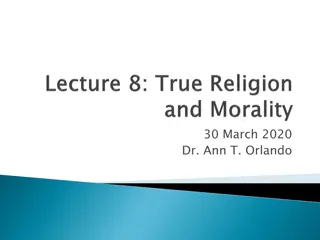Divine Providence and the Existence of Evil
Divine Providence guides creation towards perfection, while addressing the existence of evil is a central theme in Christian faith. Explore the journey of creation, human cooperation, and the moral implications of evil in this thought-provoking content.
Download Presentation

Please find below an Image/Link to download the presentation.
The content on the website is provided AS IS for your information and personal use only. It may not be sold, licensed, or shared on other websites without obtaining consent from the author.If you encounter any issues during the download, it is possible that the publisher has removed the file from their server.
You are allowed to download the files provided on this website for personal or commercial use, subject to the condition that they are used lawfully. All files are the property of their respective owners.
The content on the website is provided AS IS for your information and personal use only. It may not be sold, licensed, or shared on other websites without obtaining consent from the author.
E N D
Presentation Transcript
CREATIONS DESTINY God did not make creation "complete from the beginning," but willed "a state of journeying." God always guides all creation toward its ultimate perfection by Divine Providence. "By his providence God protects and governs all things which he has made" (First Vatican Council). God's care for every creature (from least to greatest) is concrete and immediate. God does "whatever he pleases. Christ opens and no one shuts, shuts and no one opens. "The purpose of the Lord will be established. Scripture, in attributing actions to God without mentioning any other causes, is not using a "primitive mode of speech" but is professing a faith in God's lordship over all history. Jesus tells us not to be anxious: "Your heavenly Father knows what you need. Seek first his kingdom and all these things shall be yours as well.
Inviting Us to Cooperate God uses our cooperation. In his goodness, He gives us our existence and by our free will the opportunity to cooperate in his plan. God even invites us to "subdue the earth and have dominion over it. He invites us to complete his work of creation. As knowing collaborators, we are "God's fellow workers. We believe that God, the Creator (the first Cause) is always at work in us (the second cause). "For God is at work in you. We can do nothing without God, especially gain eternal life. "Without a Creator, the creature vanishes" (Second Vatican Council).
Why is There Evil? Why does evil exist? This unavoidable and painful question can be adequately responded to only by the entire story of Christian faith, which includes the goodness of creation, the drama of sin, God's Covenants, the sendings of Jesus and the Spirit, and the founding of the Church. It includes the sacraments and the invitation to eternal life (which mysteriously can be rejected by anyone). Every aspect of Christian life is part of the answer to this question of evil.
A World in a State of Journeying God did not create a perfect world. In fact, God could have created a better world (St. Thomas Aquinas). God created this world "in a state of journeying." The more perfect exists alongside the less perfect. Nature has both constructive and destructive forces. Physical good will always be mixed with physical evil until creation reaches perfection.
Moral Evil Angels and men can freely choose to go astray. God never causes moral evil, either directly or indirectly. He permits moral evil because he respects man's freedom and knows how to draw good out of evil. "We know that in everything, God works for good for those who love him" (Rom 8:28). "God would never allow any evil if he could not cause good to emerge from it" (St. Augustine).
Good from Evil The saints witness to God drawing good out of evil. "Some rebel against what happens to them but God does nothing without the salvation of man in mind" (St. Catherine of Siena). "Nothing can come but that God wills" (St. Thomas More). "The Lord showed me that all manner of things shall be well" (Julian of Norwich). It takes time to see how God draws good from a moral evil. After being sold into slavery, Joseph told his brothers, "It was not you who sent me here, but God. You meant evil, but God meant it for good. God used Jesus' death (the greatest moral evil) for our redemption. Nevertheless, evil never becomes a good. Because we have only partial knowledge, many aspects of God's providence are hidden from us.
Heaven and Earth God is the "Creator of heaven and earth" (Apostles Creed). He created "all that is, seen and unseen" (Nicene Creed). "Heaven and earth" means creation in its entirety. It shows the bond and the distinction between earth and heaven. "Earth" is the world of men. "Heaven" designates either the firmament, God's place of final glory, or the place where saints and angels live. "From the beginning God made at once, out of nothing, both the spiritual (angels) and corporeal (earth) and, after that, God made the human creature who shares in both orders of spirit and body (Fourth Lateran Council).
With Christ Angels Christ is the center of the angelic world because "in him all things were created in heaven and on earth, visible and invisible. The angels are messengers of his saving plan. "Are they not all ministers sent forth to serve?" Scripture and Tradition teach the existence of spiritual, non-corporeal beings (angels). Angel is the name of their office (what they do) and spirit is the name of their nature (what they are). While seeing the face of God, they also are his messengers who "hearken to the voice of his Word" (St. Augustine). Angels are personal, immortal, spiritual beings who have intelligence and will. By their glory, they surpass all visible creatures.
Activity in Scripture Angels have been active from the beginning. In Genesis, they closed the earthly paradise , saved Hagar and her son, and kept Abraham from killing Isaac . Later in Scripture, they led God's people, announced births, and assisted the prophets. The angel Gabriel announced the birth of John the Baptist and the birth of Jesus. Angels announced Jesus' birth to shepherds, protected him in infancy, served him in the desert, and strengthened him in the garden. Angels witnessed to Christ at the tomb and at his Ascension. They will also announce Jesus' return to judge mankind.
Their Work Now The Church benefits from the help of angels. At funerals, the angels are asked to lead the deceased into Paradise. All believers have a guardian angel who watches them from conception to death. Angels surround all human life with their care.
Six Days of Work Symbolically, Scripture pictures God working for six days and "resting" on the seventh. These texts teach us the truths we need to know for our salvation. All creation owes its existence to God and is rooted in the primordial event of God drawing the world out of nothingness and having time begin. Because God saw his creation as "good," every creature has its own truth and goodness. Therefore, man must respect God's creation and avoid any action which would have disastrous consequences for the human race and its environment.
Man at the Summit The "six days" of creation (from the less perfect to the more perfect) show a "hierarchy" of creatures. God, however, takes care even of the lowly sparrow . Dependent and Diverse All God's creatures are interdependent. No creature is self-sufficient and all must depend upon and serve each other. This diversity brings about the universe's beauty. Scripture shows that man is at the summit of creation and clearly distinguishes his creation from all others. Created by God and ordered to his glory, all creatures have a solidarity. "May you be praised, O Lord, in all your creatures" (St. Francis of Assisi). Progressively, man discovers the universe's beauty and the laws of nature which call forth admiration and should lead man to submit to his Creator.
Day of Rest "Since on the seventh day God was finished with the work he had been doing, he rested on the seventh day. These inspired words contain much instruction. God has placed in nature a foundation of his laws which man must respect. Eighth Day The seventh day completed the first creation, but the eighth day (Christ's Resurrection) begins a new creation which culminates in the greater work of redemption. This second creation surpasses the first in splendor. God's work looked forward to the Sabbath. Therefore, worship of God is inscribed in creation. Keeping the Sabbath corresponds to God's wisdom and law.
The Four Aspects of Man "God created man in his own image, in the image of God he created him, male and female he created them" (Gen 1:27). The following paragraphs will examine these four aspects of man: 1. He is in the image of God 2. He unites in his nature both the spiritual and material worlds 3. He is male and female 4. He enjoys a friendship with God
THE HUMAN PERSON The Dignity of God s Image In material creation only man can know and love God. He was willed by God for his own sake and he is called to share in God's own life. "What made you establish man in so great a dignity? You are taken with love for him" (St. Catherine of Siena). Being in God's image makes the individual a person a "someone" and not a "something." He is capable of self- knowledge and of having friendships with other persons. He is called into a Covenant with God and can make a response of love not known by any other creature.
All for Man God created everything for man. "For man is more precious in God's eyes than all other creatures. For him the heavens and the earth exist. God did not spare his own Son for the sake of man. Nor does he ever cease to work until he has made him sit at his right hand" (St. John Chrysostom). United in Christ This mystery of man becomes clear only in the mystery of Christ. "That is why Christ took on himself the role and the name of the first Adam, in order that he might not lose what he had made in his own image" (St. Peter Chrysologus). The human race has a unity. "From one ancestor, God made all nations to inhabit the whole earth. "The human race has unity in its origin (God), in its nature (body and soul), in its dwelling place (earth), in its supernatural goal (heaven), and in the means to heaven (Christ's redemption)" (Pope Pius XII). All men are truly brothers.
Man Body and Soul Using symbolic language, the Bible says that God willed man to be both corporeal and spiritual. "Then the Lord God formed man of dust from the ground, and breathed into his nostrils the breath of life and man became a living being. In Scripture "soul" can mean human life or the entire human person. "Soul" especially means man's spiritual principle.
In God's Image Animated by a spiritual soul, the human body shares in the dignity of "God's image." The human person, body and soul, is meant to become a temple of the Spirit. In man, the material world can freely raise its voice in praise of the Creator (Second Vatican Council).
Only One Nature The spiritual soul is the "form" of the body. Man is not the union of two natures. In man, spirit and matter form one nature. God creates every spiritual soul immediately. It is not "produced" by the parents and does not perish at death. It is reunited with the body at the final resurrection. When Paul writes about "spirit, soul, and body" he used the word "spirit" to mean that the soul has a supernatural goal of union with God. The biblical word "heart" also means the place where the person decides for or against God.
God willed that man and woman would have perfect equality as human persons. "Being man" or "being woman" is a good reality and each possesses an unalienable dignity. God is neither man nor woman. He is pure spirit. The different perfections of man and woman (as mother, father, husband, wife) reflect God's infinite perfections. Equality of Man and Woman
Made for Each Other Man and woman were created for each other. Because man was alone, God created a "helper fit for him. When God fashioned the woman, the man cried out in wonder, "This at last is bone of my bones and flesh of my flesh acknowledging that woman shares his humanity. God did not make man and woman incomplete, but he created them as a "helpmate" for each other. In marriage, by becoming "one flesh," they can transmit human life and cooperate with God in creating. Although called to "subdue the earth, man and woman must not destroy creation.
Created in Original Harmony Man was created in friendship with his Creator, in harmony with himself and with all creation, and in a state surpassed only by the new creation in Christ. Our first parents, Adam and Eve, enjoyed an original "state of holiness and justice" by which they shared in divine life. While remaining in this divine intimacy, they would not suffer or die. They also possessed a personal inner harmony and a harmony with each other, and with creation. This was called "original justice."
In Control and in the Garden This divine gift of "mastery" was realized within man himself. He was free from the triple concupiscence that now subjects all men to sensual pleasure, to covetousness of earthly goods, and to false self-assertion. These three evils are "sensual lust, enticement for the eyes and a pretentious life. In the garden, work was not yet a burden but a collaboration with God. Unfortunately, our first parents lost this entire harmony by their sin.
The Source of Evil Man rightly asks "Where does evil come from?" "I sought to know where evil comes from and there was no solution" (St. Augustine). For Augustine, the mystery was clarified only by his religious conversion. We, too, examine this question of evil with our eyes upon Christ, who alone is its conqueror.
Understanding Sin Human history is filled with sin. By understanding the profound relationship of man to God the evil of sin is unmasked. Without the clarity of the Bible, we would explain sin as a weakness, a mistake or a necessary consequence of a poor social structure. By knowing God's plan, we can see that sin is really man's abuse of his freedom.
Human History and the Fall Adam and Christ Although using figurative language, the story of Adam's sin does describe an event which took place at the beginning of human history. All human history is marked by that fall of our first parents. Israel could never grasp the ultimate meaning of the story of Adam and Eve. They knew Adam (the source of sin) but not Christ (the source of grace). Only the Holy Spirit would "convict the world in regard to sin and righteousness and condemnation. This doctrine of original sin is the "reverse side" of the Good News. Jesus is our Savior because all men need to be saved. Tampering with the doctrine of original sin will undermine the mystery of Christ.
A Prior Fall - Satan Man's fall contains a "seductive voice," the voice of a fallen angel called "Satan" or the "devil." The Church teaches that Satan and other demons were created "good by God but they became evil by their own doing" (Fourth Lateran Council).
A Free Irrevocable Choice These demons made a free irrevocable choice to reject God. This rebellion is reflected in the tempter's words, "You will be like God. Having sinned from the beginning, the devil is now "the father of lies. God's mercy toward these fallen angels is useless. Their sin is unforgivable because their choice is irrevocable. "There is no repentance for the angels, just as there is no repentance for men after death" (St. John Damascene).
Disastrous Influence Because of the devil's disastrous influence, Jesus came to earth "to destroy the works of the devil, especially his power to seduce man to disobedience. Satan's power is not infinite and he cannot prevent the building up of God's kingdom. Although Satan can cause grave injuries (both spiritual and physical) God still guides all human history. Why God permits demonic activity is a mystery. "We know that in everything God works for good with those who love him"
The First Sin Man's Need to Be Tested Man had to freely accept God's friendship. God's command to Adam (not to eat of the tree of knowledge of good and evil) shows symbolically that man had to acknowledge his limits as a creature and submit his behavior to God's laws. By sin, man set aside his trust in God and disobeyed. All subsequent sin would be disobedience and lack of trust. By sin, man rebelled against his status as a creature. Man chose to be like God "without God and not in accordance with God" (St. Maximus).
What They Lost Our first parents lost original holiness and became afraid of God, whom they falsely thought was jealous of his prerogatives. The soul's control over the body's powers was shattered. The union of man with woman became subject to tensions and their sexual relationship was marked by lust and domination Creation became hostile to man and death made its entrance into human history. "Sin entered the world and through sin, death.
Sin inundated human history and even entered God's Covenant with Israel. Even after Christ's death, sin was present in the Christian community. There is a universality of sin. This is confirmed by our own experience. "Often refusing to acknowledge God, man has broken the right order that should reign within himself and with other creatures" (Second Vatican Council). A History of Sin
Deprived of Our Heritage By original sin, we are deprived of original holiness and justice. Human nature is not totally corrupted but is wounded in its natural powers. It is subject to ignorance, sin, and death, and has an inclination to evil (called "concupiscence"). Baptism erases original sin and turns the person back to Christ. However, the inclination to sin that persists requires that man be in a constant, spiritual battle.
Two Errors Pelagius (5th century) reduced the influence of Adam's fault to bad example and taught that man could lead a good life without God's help. In contrast, the first Protestant teachers (16th century) taught that original sin had radically permeated man, and man's tendency to evil was insurmountable. The Church taught against Pelagius at the Council of Orange and against Protestant teachers at the Council of Trent.
Today's Battle A Battlefield Due to Sin Original sin provides great insight into man's activity in the world. Although remaining free, man has come under "the devil, who has the power of death" (Council of Trent). Man is ignorant of his own inclination to evil and makes serious errors in education, politics, and social action. Original sin and all personal sins place the world in a sinful condition. This "sin of the world" refers also to the negative influences exerted by sinful social structures. A dramatic situation exists in which "the whole world is in the power of the evil one. Man is on a battlefield and only by God's aid does he succeed in achieving his own inner integrity (Second Vatican Council).
A Promised Victory After original sin, God still called man and even promised a victory. He announced that there would be a Messiah and Redeemer, a battle between the serpent and the Woman, and the final victory for her descendants: "I will put an enmity between you and the woman and between your offspring and hers, he will strike at your head while you strike at his heel. This passage announces Christ as the "New Adam" who superabundantly makes amends for Adam's sin. Many church Fathers see Mary as the "new Eve," the first to benefit from Christ's redemption by her Immaculate Conception and freedom from all personal sins.
Transmission of Effects Everyone Affected We do not exactly know how this "original sin" is transmitted. Adam and Eve were supposed to transmit original holiness and justice to everyone. In their "fallen state" they could only pass on a human nature deprived of original holiness and justice. Therefore, original sin differs from other sins. It is contracted (a state) not committed (an act). All are implicated in sin. "Death spread to all men because all men sinned. However, all are offered salvation in Jesus Christ. "One man's act of righteousness leads to acquittal and life for all men. This overwhelming misery which oppresses is connected with the fact that Adam's sin has been transmitted to all at birth. This sin is the "death of the soul." Therefore, the Church baptizes even tiny infants "for the remission of sins" (Council of Trent).
Why Was Sin Permitted? Many Christian writers answered that question. "Christ gave us better blessings than the devil took away" (Leo the Great). "There is nothing to prevent human nature from being raised up to something greater, even after sin" (Thomas Aquinas). "O happy fault... which gained for us so great a Redeemer" (Easter Vigil Exsultet).


